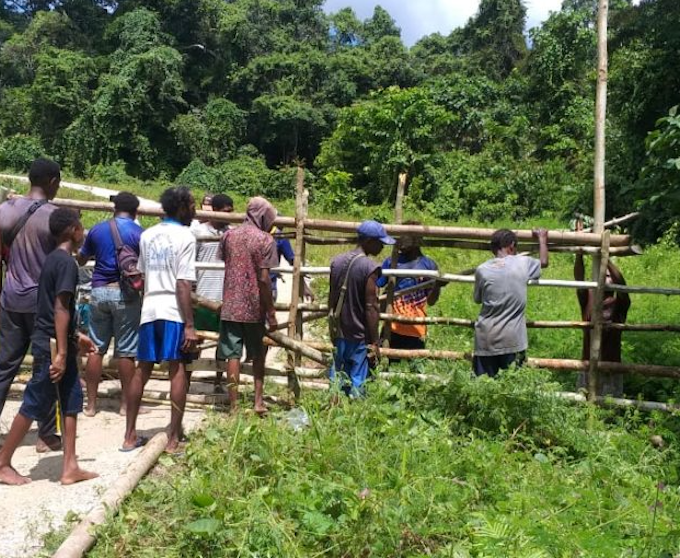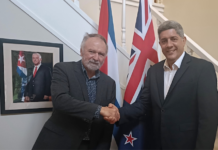
By Basten Gokkon of Mongabay
Local authorities and indigenous communities in Indonesia’s Papua region have imposed a sweeping lockdown in an attempt to minimise the spread of the novel coronavirus.
The region, which comprises the provinces of West Papua and Papua, is the least developed in Indonesia, with scant public health facilities, poor road connectivity, and the highest rates of maternal and infant mortality in the country.
Faced with the challenge of containing a covid-19 outbreak in these circumstances, the provincial governments have temporarily restricted air and sea traffic into the region, with the exception of the freight traffic.
READ MORE: Surge in Papua covid-19 cases in Timika mining hub
In the Papuan hinterland, indigenous communities have blocked road access into their villages for outsiders.
There are fears that a covid-19 outbreak here, particularly among the more than 300 indigenous tribes, could have a disastrous impact. The first case of infection among indigenous people has already occurred in the Brazilian Amazon.
However, in spite of the lockdown efforts Pacific Media Watch reports that infections are already spreading with 205 cases and six deaths reported in Papua and 37 cases and one death recorded in West Papua province.
Health authorities have reported a surge in the mining hub of Timika with 51 cases – the highest of any regency in the West Papuan region.
The total for Indonesia was 10,118 cases and 792 deaths.
Vulnerable communities
In Papua province, where the travel restriction came into force on March 26, Governor Lukas Enembe said a full closure could be implemented for three indigenous territories in the province: Lapago, Meepago and Animha.
He said these communities were particularly “vulnerable” to infection.
In West Papua, authorities followed with their own travel restriction on March 30.
Activists have welcomed the measures to restrict arrivals from outside and to close off vulnerable areas, given the lack of adequate health care facilities in the region. The government has designated just five hospitals to treat covid-19 patients in the region — an area double the size of the United Kingdom and home to 4 million people.
Between them, the hospitals have access to a combined 60 ventilators, and have had to rely on the national government for supplies of personal protective equipment for health workers.
“Most of the tribes have small populations, so they are vulnerable to extinction when faced with the covid-19 pandemic,” Rukka Sumbolinggi, the general secretary of the Indigenous Peoples Alliance of the Archipelago (AMAN), said in a statement.
“Indigenous communities are unfamiliar with its spread and with the medication [needed] for patients.”
Local village initiatives
Many communities have taken the initiative to shut down road access to their villages.
Franky Samperante, the executive director of the Pusaka Foundation, which works with indigenous communities, said residents in Papua’s Boven Digoel and Maybrat districts had closed off their villages to people from other areas. He added that indigenous communities were also carrying out traditional rituals that they believed could deflect bad energy.
“These people have heard some information about the coronavirus and the horrors of covid-19, and they are worried about it,” he told Mongabay.
These lockdowns will be important in preventing outsiders from bringing the virus into indigenous communities, said Christian Ari, director of the NGO Perkumpulan Silva Papua Lestari (PSPL). Members of these communities have strong social relationships, so practicing physical distancing once an infection has been recorded will be difficult, he said.
“If the government hadn’t taken strong actions there could be many deaths of Papuans, with implications for the political dynamic in Papua,” Christian said. “Papuans could take the view that they were being intentionally murdered by the state.”
Ari added that his team also had to deal misinformation making the rounds in these communities.
“Some people believe that the virus only attacks officials who travel out of town and not them,” he said.
Plantation restrictions called for
Samperante called on authorities to also restrict the activities of plantation and mining companies operating in the vicinity of indigenous lands to mitigate the risk of infection by workers.
“The people can’t control these workers for development projects, and they are potential carriers of diseases that might infect the people in the villages,” he said.
Ari said the authorities should ensure the availability of food supplies for communities that had chosen to shut their villages off, including those accustomed to foraging in the forests.
He said food insecurity could compel members of these communities to leave their villages in search of food, thereby running the risk of encountering other people and possibly becoming infected.
But while activists see these restrictions as necessary, the national government in Jakarta has criticised the travel ban. The government insists only it has the power to impose such a measure, and to date has refused requests from other regions to impose lockdowns, citing dire economic impacts.
Ricky Ham Pagawak, the head of Papua province’s Central Mamberamo district, said the restrictions were legally valid and necessary to protect public health, and had been approved by local police and legislators.
“Whatever happens in Papua, Papuans are responsible, and the district heads, mayors and governors are responsible,” Pagawak said. “This is our people, our land, our country.”
Basten Gokkonis a Jakarta-based writer and contributor to Mongabay with an interest in wildlife conservation, renewable energy efforts, and indigenous peoples empowerment.













































